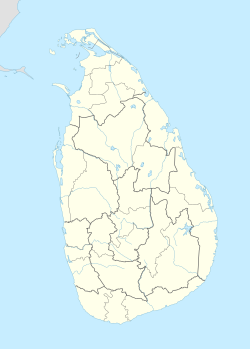This article needs additional citations for verification. (September 2017) |
Hatton
හැටන් ஹட்டன் | |
|---|---|
Town | |
 | |
| Coordinates: 6°53′23″N 80°35′53″E / 6.88972°N 80.59806°E | |
| Country | Sri Lanka |
| Province | Central Province |
| District | Nuwara Eliya District |
| Divisional Secretariat | Nuwara Eliya Divisional Secretariat (Ambagamuwa Divisional Secretariat) |
| Established | 1821[citation needed] |
| Government | |
| • Type | Urban Council |
| • Body | Hatton Dickoya Urban Council |
| • Chairman | S. Balachandran (Unofficial Magistrate) |
| Elevation | 1,271 m (4,170 ft) |
| Population (2018) | |
• Total | 15,073 |
| [citation needed] | |
| Time zone | UTC+5:30 (Sri Lanka Standard Time Zone) |
| Postal code | 22000 |
| Area code | 051 |
Hatton (Sinhala: හැටන්, Tamil: ஹட்டன்) is a major town in the Nuwara Eliya District of Central Province, Sri Lanka governed by the Hatton-Dickoya Urban Council. Hatton is a major centre of the Sri Lankan tea industry.[1][2]
Hatton is one of the busiest cities in the hill country of Sri Lanka and is colloquially known as the tea capital of the country, as it is the central point for most upcountry tea growing regions, such as Maskeliya, Talawakelle, Bogawantalawa and Dickoya.[3][4]
Hatton is located approximately 112 km (70 mi) southeast of Colombo and 72 km (45 mi) south of Kandy, at an elevation of 1,271 m (4,170 ft) above sea level.
Hatton was founded during the British colonial times in order to serve the coffee plantations and latter tea estates. The name of the town refers to the village in Aberdeenshire, Scotland. A number of the surrounding tea estates are also named after Scottish villages.
Hatton serves as a gateway to Adam's Peak (Sri Pada) and Sinharaja Forest Reserve, but is better known for its Ceylon tea plantations. Over 48% of the town's population employed on tea estates.[5]
Transport
The Hatton Railway Station is located on the Main Line (Colombo-Badulla) railway line
The town is located on the A7 highway (Avissawella-Nuwara Eliya) a part of the Avissawella-Nuwara Eliya main road.
Attractions
- Adam's Peak, a 2,243 m (7,359 ft) high mountain, which is major Buddhist pilgrimage destination
- Devon Falls, a 97 m (318 ft) high waterfall
- Dunbar Ground
- Holy Cross Church (Catholic)
- Laxapana Falls, a 126 m (413 ft) high waterfall
- Jummah Masjid / islamic mosque
- Maanica Pillayaar/Sri Manickapillayar Kovil, a Hindu temple dedicated to Ganesh
- Castlereigh Dam
- St. Clair's Falls, a 80 m (260 ft) high and 50 m (160 ft) wide waterfall
- Shri Nigrodharamaya Buddhist Temple
- Singha Malai Tunnel, the longest railway tunnel in Sri Lanka (located between Hatton and Kotagala)
- 60 feet bridge, a 18.3 m (60 ft) long steel railway bridge (located between Hatton and Kotagala)
- Sri Muthu Mariyamman Kovil, a Hindu temple
- Subramaniam Kovil, Hindu temple dedicated to Murugan
Education
- Highlands Central College
- Highlevel International School
- Life-spring English Academy
- Oxbridge International College
- St. Gabriel's Convent
- St. John Bosco's College
- Shannon Tamil Maha Vidyalayam
- Sri Pada Central College
- Univenture international
- Webster International School
Economy
Hatton is the largest town in the Nuwara Eliya District. A number of major corporations have branch offices in Hatton, servicing industries including textiles, tea, furniture and information technology.[citation needed] The Hatton National Bank,[6] the largest privately owned commercial bank in the country, and Brown and Company, a leading engineering firm, were both founded in Hatton.[7]
Neighbourhoods
References
- ^ Cave, Henry William (1908). The Book of Ceylon, Volume 2. Cassell Limited. p. 451.
- ^ Murray, J (1955). Murray's Handbook, India, Pakistan, Burma & Ceylon. p. 578.
- ^ "Hatton". Sri Lanka Tourism. Retrieved 20 May 2020.
- ^ Sidhant Sibal (24 February 2019). "India hands over 155 houses in Central Sri Lanka under its development programme". WIO News. Zee Media Corporation. Retrieved 20 May 2020.
- ^ Bass, Daniel (2013). Everyday Ethnicity in Sri Lanka: Up-country Tamil Identity Politics. Routledge. p. 13. ISBN 9780415526241.
- ^ "Our History". Hatton National Bank. Retrieved 15 December 2014.
- ^ Randhawa, Bikki K.; Sacay, Orlando J.; Gallardo, Joselito S. (Ed) (1997). A Commercial Bank's Microfinance Program: The Case of Hatton National Bank in Sri Lanka, Parts 63-369. World Bank Publications. p. 7. ISBN 9780821340028.









